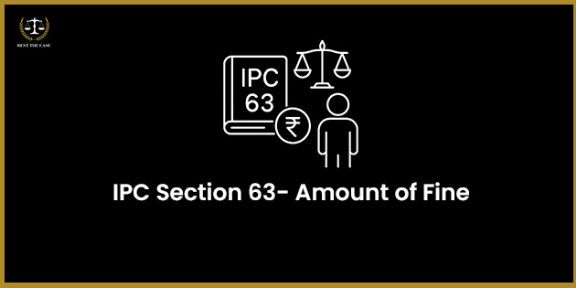
In India’s criminal justice system, punishment is not only about imprisonment or capital sentences. Fines also form an important part of sentencing, especially in cases involving minor offences or financial wrongdoing. Section 63 of the Indian Penal Code (IPC) deals with the amount of fine that can be imposed by a court when a law allows for a fine without specifying its upper limit. Though it may appear technical or insignificant, IPC Section 63 plays a critical role in limiting excessive punishment and ensuring that monetary penalties remain fair, proportionate, and legally sound.
What We’ll Explore in This Blog
- The original meaning and legal explanation of IPC Section 63
- The purpose of placing a limit on fines
- Judicial discretion and safeguards under this section
- Practical applications and examples
- Its relevance in today’s criminal justice system
- Judicial interpretations and significance
What Is IPC Section 63?
Section 63 of the Indian Penal Code states:
"Where no sum is expressed to which a fine may extend, the amount of fine that the court is competent to impose is unlimited but shall not be excessive."
Simplified Explanation:
When the IPC prescribes a punishment involving a fine but does not specify the maximum amount, courts have the discretion to impose any amount; however, it must not be excessive or arbitrary. The key safeguard built into this provision is the requirement that fines remain reasonable and proportionate to the offence.
Why Is Section 63 Important?
Section 63 plays a protective role in criminal jurisprudence by restricting the misuse of discretion. It ensures that:
- Monetary punishment does not become excessive or oppressive
- The fine corresponds to the gravity of the offence and the financial condition of the offender
- Courts remain within bounds while penalizing economically
This section is particularly relevant in cases where only a fine or a fine along with imprisonment is imposed, but the statute is silent on the upper limit of the fine.
Judicial Discretion and Safeguards
The word "not be excessive" is the heart of Section 63. This implies a constitutional and legal obligation on judges to:
- Evaluate the financial condition of the offender
- Consider the impact of the fine on the convict’s life and livelihood
- Keep the punishment proportionate to the seriousness of the crime
Judges often rely on the principles of proportionality and reasonableness while imposing fines. Excessive fines have been struck down by appellate courts when found disproportionate or unaffordable for the convict.
Practical Application of Section 63
Let’s say a person is convicted of public nuisance under IPC Section 268, which allows for a fine but does not cap the amount. Under Section 63, the judge can impose a fine of Rs. 500 or Rs. 5,000, depending on:
- The facts of the case
- Whether it is a repeat offence
- Whether the accused can afford the fine
- The extent of harm caused
In another case, if someone commits a minor act of criminal trespass (Section 447 IPC), the court might impose a small fine instead of imprisonment. Again, Section 63 allows the court to decide the amount but keeps it in check by the clause that it should not be excessive.
Judicial Observations on Section 63
Indian courts have repeatedly emphasized moderation and fairness in monetary penalties. The Supreme Court, in various judgments, has highlighted that financial penalties should be neither tokenistic nor crippling. Courts must weigh the facts, the financial capacity of the accused, and the nature of the crime. For instance, in Shaikh Ayub v. State of Maharashtra (1998), the Bombay High Court set aside an unreasonably high fine imposed on a daily wage laborer, holding that fines must be "realistic and not ruinous".
Why Section 63 Matters in Modern Sentencing
Section 63 remains a critical balancing tool in sentencing today because:
- Many offences are compoundable or petty, where fines are more appropriate than jail
- It enables courts to impose flexible yet reasonable monetary penalties
- It ensures judicial discretion is not abused in the absence of legislative limits
As India moves toward decriminalizing minor offences and promoting alternatives to imprisonment, Section 63 supports this vision by keeping financial penalties within humane and practical limits.
Conclusion
IPC Section 63 may not often make headlines, but it plays a silent yet significant role in India’s criminal sentencing structure. By giving courts the power to impose fines even where no maximum limit is prescribed- but simultaneously cautioning them not to be excessive- the section ensures that justice is both firm and fair. This provision helps judges tailor punishments based on real-life considerations like the offender’s income, intent, and impact of the crime. As courts increasingly rely on fines as a substitute for short-term imprisonment, Section 63 becomes all the more essential to prevent disproportionate economic punishment.
Frequently Asked Questions
Q1. What does IPC Section 63 deal with?
It governs the amount of fine when no maximum limit is provided under a penal provision. It allows the court to impose any amount, as long as it is not excessive.
Q2. Who decides what is an excessive fine?
The judge decides based on the facts of the case, financial status of the accused, and principles of fairness. Appellate courts can review and reduce an excessive fine.
Q3. Can a person be jailed for non-payment of a fine?
Yes, under Sections 64 and 65 of the IPC, a person may face imprisonment in default of payment, but only for a certain duration depending on the fine.
Q4. Is there any upper limit on fines in IPC Section 63?
Technically, no. But the fine must not be excessive and must comply with constitutional safeguards against arbitrary punishment.
Q5. Why is Section 63 important in criminal law today?
It ensures monetary penalties remain fair, proportionate, and realistic, especially when minor offences are punished by a fine alone without imprisonment.






